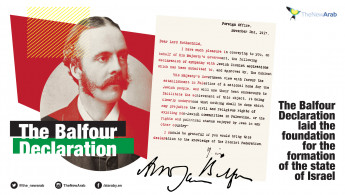What was the Balfour Declaration?
What was the Balfour Declaration?
Explainer: One hundred years ago, on 2 November, 1917, then British Foreign Secretary James Balfour wrote a signed letter to Walter Rothschild, a committed British Zionist peer and aristocrat.
2 min read
[TNA]
One hundred years ago on 2 November, 1917, then British Foreign Secretary James Balfour wrote a signed letter to Walter Rothschild, a committed British Zionist peer and aristocrat.
The document, a mere 124 words in total, was to have far-reaching consequences for the Middle East.
Written by the world's foremost empire, the letter transformed the trajectory of the nascent Zionist movement, legitimising its political aspirations for the ultimate goal of establishing a Jewish state in Mandate Palestine.
For Palestinians, who formed more than 90 percent of the British Mandate of Palestine's population at the time, the letter was an act of betrayal, promising their land to others at the stroke of a colonial pen.
While the letter did not create the State of Israel, it was the first significant declaration by a global superpower in favour of Zionism's goals.
Despite the document's two important qualifications not to prejudice the "civil and religious rights" of Palestine's "existing non-Jewish communities", the letter ultimately paved the way for mass Jewish immigration, which created a pattern of displacement and discrimination against Palestinians which continues to this day.
Israel and its supporters remember the Balfour Declaration as an historic gesture of support towards the Zionist narrative of return from exile. The Israeli prime minister's official residence in Jerusalem is today located on Balfour Street.
For Palestinians, still stateless 100 years later, the letter is an historic mark of colonial duplicity, reflected in the present day reality of settlement building, exile and dispossession amid an ongoing struggle for statehood.
The document, a mere 124 words in total, was to have far-reaching consequences for the Middle East.
Dear Lord Rothschild,
I have much pleasure in conveying to you, on behalf of His Majesty's Government, the following declaration of sympathy with Jewish Zionist aspirations which has been submitted to, and approved by, the Cabinet:
His Majesty's Government view with favour the establishment in Palestine of a national home for the Jewish people, and will use their best endeavours to facilitate the achievement of this object, it being clearly understood that nothing shall be done which may prejudice the civil and religious rights of existing non-Jewish communities in Palestine, or the rights and political status enjoyed by Jews in any other country.
I should be grateful if you would bring this declaration to the knowledge of the Zionist Federation.
Yours,
Arthur James Balfour
Arthur James Balfour
Written by the world's foremost empire, the letter transformed the trajectory of the nascent Zionist movement, legitimising its political aspirations for the ultimate goal of establishing a Jewish state in Mandate Palestine.
For Palestinians, who formed more than 90 percent of the British Mandate of Palestine's population at the time, the letter was an act of betrayal, promising their land to others at the stroke of a colonial pen.
While the letter did not create the State of Israel, it was the first significant declaration by a global superpower in favour of Zionism's goals.
Despite the document's two important qualifications not to prejudice the "civil and religious rights" of Palestine's "existing non-Jewish communities", the letter ultimately paved the way for mass Jewish immigration, which created a pattern of displacement and discrimination against Palestinians which continues to this day.
Israel and its supporters remember the Balfour Declaration as an historic gesture of support towards the Zionist narrative of return from exile. The Israeli prime minister's official residence in Jerusalem is today located on Balfour Street.
For Palestinians, still stateless 100 years later, the letter is an historic mark of colonial duplicity, reflected in the present day reality of settlement building, exile and dispossession amid an ongoing struggle for statehood.



